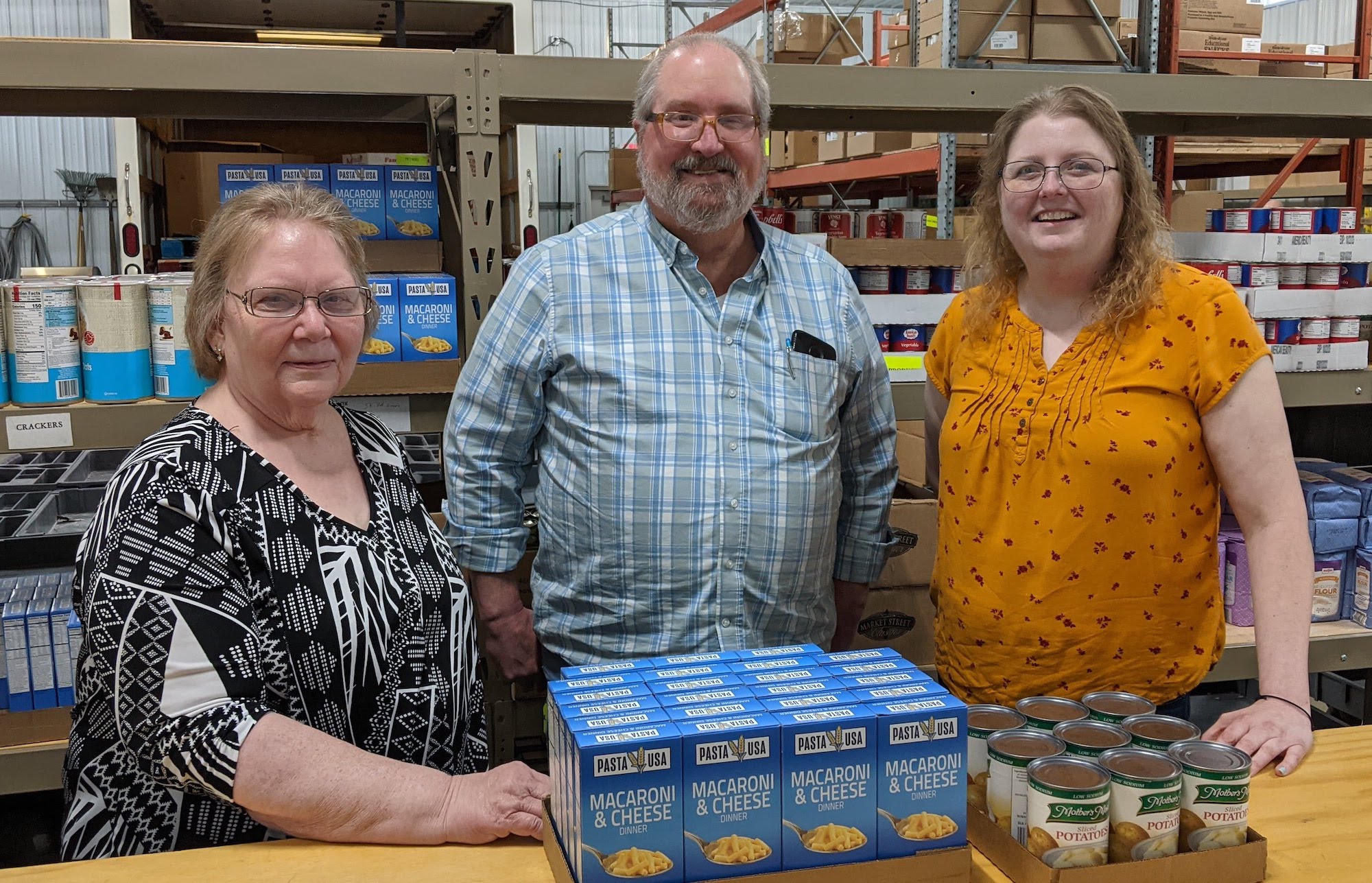Helping Hands Food Pantry in Charlotte is celebrating its 40th anniversary with an open house on Sunday, May 15, from 11:00 a.m. to 3:00 p.m. The public is invited to visit the pantry at 621 Jefferson St. in Charlotte to enjoy refreshments and see firsthand how Helping Hands distributes 700,000 pounds of food every year to low-income residents of Eaton County.
Helping Hands has grown exponentially since it was launched in 1982 as a joint ministry of several local churches. The pastors who conceived the idea were seeking a more effective way to fulfill requests from parishioners and community members for food and other essentials, says Ric Mathew, who served as associate pastor of First Baptist Church in Charlotte at the time. “The needs became greater than we could individually provide,” Mathew says. “It was apparent that together as churches we could best meet these needs.”
Helping Hands’ original function was to refer people to local organizations that could provide food, lodging, and other services, but it wasn’t long before they began collecting donations of food to give away. Barb VanderMolen, who currently serves as treasurer, started volunteering when the fledgling nonprofit was just a few months old, answering the phone one morning a week. “If we had one phone call a day, we were doing well,” she recalls.
By the mid-1980s Helping Hands had outgrown its first office, a back room in a building on Henry St., and had moved to 212 W. Shepherd St. As other area nonprofits sprang up to provide housing, clothing, pregnancy services, and more, Helping Hands began to focus its mission on distributing food.
In 1998 Helping Hands was serving 35 to 40 families each month. The pantry moved into a building at the corner of South Cochran and Shaw that would be its home for 21 years. “When we bought that building, we thought we would never use all the space,” says VanderMolen.
But hard times were coming. The 54-day General Motors strike that year had a trickle-down effect on the state’s economy, bringing an influx of clients to Helping Hands. “The numbers just kept going up and up,” recalls Pam Huffman (at left in photo), who had taken on the role of director shortly after the move.
Greater awareness of Helping Hands’ services, coupled with expanding capacity thanks to partnerships with organizations such as the Greater Lansing Food Bank, spurred further growth. Within five years Helping Hands had tripled the number of aid requests it was filling. By 2009 the client base had doubled again: the food pantry was serving more than 250 households every month.
Operating a rapidly growing ministry dependent on donations from churches, businesses, and individuals frequently stretched the faith of staff and volunteers. “At one time our finances were so bleak that we didn’t have enough money to pay the director,” says VanderMolen. “Then someone donated $1,000, and we were able to pay the director, the mortgage, and the utilities that month.”
Huffman too has seen many times when God provided in unexpected ways. Once a local business owner offered to donate wooden shelving units from his store that was closing. When Huffman and colleague Phil Grimwood (in the center of photo) went to look at the shelves, they discovered five rooms full of them! They received more than enough to fill the upstairs level at Helping Hands, dramatically increasing the amount of food they could store. “Little did we know that over the next four years our number of clients would increase by almost 50 percent,” Huffman says.
Grimwood, who succeeded Huffman as director, found that faith-building experiences were especially common during the hectic months in 2019 when he supervised construction of the pantry’s current facility at 621 Jefferson St. “Regardless of all your skills, gifts, and life experiences, you get to a point where you don’t know what to do,” Grimwood says. It was in those moments that he saw God provide breakthroughs that seemed to “fall out of the sky.”
Perhaps the most striking of these providences: the $431,000 building was debt-free within a year despite a minimalist fundraising campaign. The timing was perfect. A few months after the new building opened, the COVID-19 pandemic hit, necessitating major procedural changes that would have made it impossible to assist clients in the cramped, aging building that Helping Hands had just left.
Today Helping Hands serves more than 400 households every month at a cost of just $6 per person for a week’s worth of food and personal care items. The food pantry continues to operate as a faith-based, interdenominational nonprofit with just two paid part-time staff and more than 40 volunteers.
The impact of Helping Hands is best expressed by its grateful clients. “I’m disabled and struggle to get through each month,” wrote one Charlotte resident. “Without the food they help me with each month, I would not eat every day.”
For Amanda Thompson (at right in photo)—once a client of Helping Hands, then a volunteer, and now the director—the food pantry’s longevity is a testimony to the generosity of churches, businesses, community organizations, and everyday people who have rallied to support its mission. “It’s amazing that Helping Hands has stood the test of time. It has been a group effort all the way around. We are looking forward to being here for many more years to serve the community.”
Donations to Helping Hands enable Thompson and her team to continue feeding the hungry in Eaton County. Give online at helpinghandsfoodpantry.org or mail a gift to Helping Hands Food Pantry, 621 Jefferson St., Charlotte, MI 48813.
“Everyone is invited to attend the open house on May 15 and learn more about what we do,” says Thompson. “We are grateful for the community support that has enabled us to reach this 40-year milestone.”

